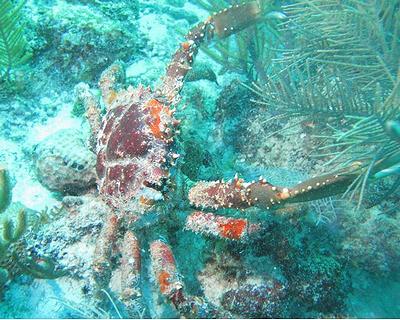
MIAMI, Florida, January 28, 2021 (ENS) – With the dangers of climate change increasing at a rapid rate, Caribbean coral reefs are in decline, overcome by seaweed. Now scientists think that they have found a solution for the infested reefs – herbivorous crabs that enjoy a seaweed diet.
On December 10, 2020, researchers with Florida International University, FIU, reported in the journal “Current Biology” that native crabs in the Florida Keys could help break down the seaweed by eating it and so could help to restore the reefs.

FIU Professor of Tropical Ecology and Conservation Mark J. Butler IV, and co-author Angelo “Jason” Spadaro have been observing marine habitats in the Florida Keys for over 30 years.
With his experience in the Keys, Butler and his team were able to observe the symbiotic relationship that Caribbean king crabs have with the coral reefs there.
“Experimentally increasing the abundance of large native, herbivorous crabs on coral reefs in the Florida Keys led to rapid declines in seaweed cover and, over the course of a year or so, resulting in the return of small corals and fishes to those reefs. This opens up a whole new avenue for coral reef restoration,” explained Butler.
Once the herbivorous crabs increase in the wild, they could help combat the seaweed and restore coral reefs, which had been projected to completely disappear by the year 2100, according to the American Geophysical Union.
“Crabs are basically cleaning house so the corals can do better,” said Butler, the FIU study’s senior author.
The Caribbean king crabs are able to consume a large amount of seaweed compared to other fish and invertebrates species found in the Caribbean.
These crabs also eat types of seaweed that all other species in the area tend to avoid.
Still, these crabs are not numerous enough to consume the amount of seaweed produced within the reef, leading researchers to question whether they can raise the wild crab population enough to help restore a balance within the reef.
Researchers started conducting experiments in 2014 by splitting 12 remote coral reef patches into three different experimental groups:
– reefs that had crabs added to them
– reefs that had divers cleaned of seaweed and algae before adding crabs
– and reefs that had not undergone any manipulation.
When the experiment began, 85 percent of the reef was covered in layers of seaweed but once the scientists added crabs to the seaweed-infested reef, the amount of seaweed covering the reef dropped to less than 50 percent of its former extent.
The reefs that had been stripped of the seaweed before adding the crabs had 80 percent less seaweed than it had at the beginning of the experiment.
While just cleaning the seaweed from the reefs made a big difference, this is only a short-term solution unless crabs could also be introduced, the researchers found.

The amount of seaweed remained constant in the experimental group that had no manipulating factors.
Butler directed another year of research to confirm early promising results. “When Jason showed me the results he had compiled from our first year of experiments, I couldn’t believe it – they looked too good. I said, ‘Nobody will believe these results. We have to repeat the experiment for another year at another location…’ We did [the experiment again] and the results were the same,” said Butler.
On average, releasing crabs into seaweed infested water reduced the amount of seaweed in the reef by 50 percent, while releasing crabs into reefs that had been cleaned of seaweed first reduced the seaweed levels by around 70 percent.
These findings reveal that herbivorous crabs may be one solution to help restore coral reefs and mitigate the foreign species build-up.
This is a cheaper and easier alternative to the common method of relocating healthy coral to reefs that have become degraded.
Researchers are now finding the resources to set up nurseries to raise large numbers of Caribbean king crabs to put these new findings into action.
“The third longest barrier coral reef in the world that fringes the Florida Keys now has less than two percent coral cover,” said Butler.
“Conquering the challenge of climate change coupled with local reef restoration, like the development of stocking programs for herbivorous crabs, are immediately necessary to reverse this decline. Our findings mean little if they don’t result in tangible new restoration efforts.”
This research was supported by an NOAA-Nature Conservancy Community-Based Restoration Grant, a Garden Club of America Fellowship in Ecological Restoration, and a Paul Kirk Wetland Research Fellowship.
To read the full study, “Herbivorous crabs reverse the seaweed dilemma on coral reefs,” click here.
— By Georgia Seidman
Copyright Environment News Service (ENS) 2021. All rights reserved.
© 2021, Environment News Service. All rights reserved. Content may be quoted only with proper attribution and a direct link to the original article. Full reproduction is prohibited.



